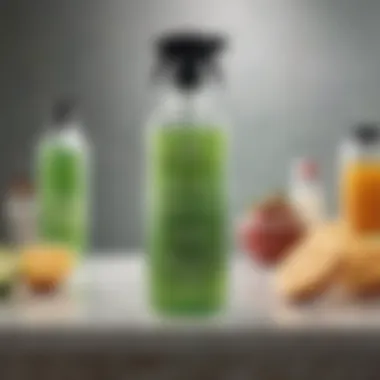Mastering Shower Glass Cleaning Techniques


Intro
Cleaning shower glass can be a frustrating task for many homeowners. Over time, water spots, soap scum, and mineral buildup accumulate, creating an unsightly appearance. Understanding the nature of these issues is essential to develop effective cleaning strategies. This guide aims to explore practical solutions and maintenance tips that will ensure your shower glass remains clear and spot-free. Whether you prefer commercial products or natural alternatives, there are various ways to achieve your goal without compromising on quality or environmental considerations.
Cleaning Challenges
Water Spots
Water spots occur due to the evaporation of water that leaves mineral deposits behind. Hard water is a common culprit, as it contains minerals like calcium and magnesium that contribute to these spots.
Soap Scum
Soap scum forms when the combination of soap and hard water creates a filmy residue on surfaces. Regular exposure to moisture exacerbates this issue, making shower glass an ideal breeding ground for buildup.
Mineral Buildup
Similar to water spots, mineral buildup is a result of minerals found in tap water. These deposits can be stubborn and difficult to remove if they are not addressed promptly.
Recipe Overview
Brief Description of the Solutions
This section covers various cleaning solutions ranging from store-bought cleaners to eco-friendly options, allowing readers to choose based on their preference and environmental impact.
Key Ingredients
- Vinegar: A natural acid that cuts through mineral deposits and soap scum.
- Baking Soda: A gentle abrasive that aids in scrubbing without scratching.
- Commercial Glass Cleaners: Formulated chemicals designed specifically for glass surfaces.
Preparation Guidelines
Step-by-Step Instructions
- Select Your Cleaner: Choose between a commercial cleaner or a natural solution like vinegar and baking soda.
- Apply the Cleaner: Spray the cleaner generously on the glass surface.
- Let It Sit: Allow the cleaner to work on the stains for several minutes.
- Scrub the Glass: Use a non-abrasive sponge or cloth to scrub the area. For stubborn stains, a paste of baking soda and vinegar can provide added scrubbing power.
- Rinse Thoroughly: Make sure to remove all cleaner residue by rinsing with clean water.
- Dry the Glass: Use a microfiber cloth to dry the surface, preventing new spots from forming.
Preparation Tips and Tricks
- For best results, clean the shower glass regularly to prevent buildup.
- Consider using a squeegee after each use to minimize water spots.
- Test any cleaning solution on a small, inconspicuous area first to ensure it does not damage the glass.
"Regular maintenance is key to maintaining clear shower glass. With the right approach, you can avoid buildup and preserve the clarity of your glass surfaces."
By integrating these strategies into your cleaning routine, you will not only improve the appearance of your shower glass, but also extend its lifespan. The methods discussed here provide effective solutions, balancing efficiency with environmental considerations.
Understanding the Challenges of Shower Glass Cleaning
Cleaning shower glass is a task many face. Understanding the challenges involved is crucial. It helps in approaching the cleaning process more effectively and efficiently. The surface of shower glass often attracts dirt, grime, and other residues. Recognizing common cleaning problems allows you to choose the right methods and products.
Common Issues Faced
Shower glass cleaning can be problematic due to various issues. These difficulties arise from factors like water quality, usage patterns, and surface materials.
Soap scum accumulation
Soap scum is a persistent problem. It forms when soap mixes with minerals and residue in the water. This mixture creates a cloudy film over time. Soap scum not only looks unattractive but can also be challenging to remove. It sticks to glass surfaces, making it a common concern that needs addressing. The main characteristic of soap scum is its slimy texture, which varies based on the soap type used and water hardness. This characteristic makes soap scum a popular topic in shower cleaning discussions, as it significantly affects the clarity of glass.
Moreover, soap scum can trap bacteria and mildew, leading to further complications. Therefore, understanding its nature helps in selecting appropriate cleaning strategies.
Water stains and mineral deposits
Water stains are another major issue. They occur when water evaporates, leaving behind minerals. The most common mineral deposits are calcium and magnesium. These stains can appear as white spots or streaks on glass. Their presence can diminish the overall appearance of your shower enclosure. Water stains also become harder to remove the longer they sit.


Like soap scum, the unique feature of water stains is their association with water quality. Hard water, which contains high mineral content, exacerbates this issue. This characteristic makes discussions around water stains relevant in our article, as they pose practical challenges in glass cleaning. Proper management of this problem encourages better maintenance of shower glass.
Mold and mildew growth
Mold and mildew thrive in humid environments, making them common in bathrooms. These fungi can appear as dark spots or streaks on glass. Preventing mold growth is essential for hygiene and aesthetic reasons. Mold and mildew can be harmful to health, and their presence indicates poor ventilation.
They typically feed on organic matter, such as soap residue or skin cells, therefore contributing to poor bathroom air quality. Knowing this helps in implementing preventive measures and improving the overall cleanliness of shower areas. Their ability to proliferate quickly in damp conditions highlights the importance of clean spaces.
Factors Affecting Cleaning Difficulty
Several factors contribute to the cleaning difficulty of shower glass. Understanding these aspects assists in creating effective cleaning routines.
Type of glass used
The type of glass in a shower makes a difference. For instance, tempered glass is more durable but might be etched more easily if not maintained. The surface texture may also affect the final outcome, as some glasses repel water better than others. This characteristic is essential as it determines the ease of cleaning. Therefore, knowing the glass type helps in choosing suitable cleaning methods and products.
Water hardness levels
Water hardness influences residue formation. Hard water leads to increased mineral deposits, while soft water minimizes them. As a result, you may notice more stains if you live in an area with hard water. This factor makes it indispensable for effective shower cleaning discussions. Adapting cleaning methods according to local water quality can improve results.
Frequency of cleaning
How often you clean your shower glass impacts its condition. Regular maintenance can help prevent buildup. If cleaning occurs infrequently, more intensive efforts are required to remove stubborn residues. Establishing a cleaning routine is vital for keeping the glass clear. This aspect reinforces the need for a tailored approach based on individual habits and lifestyle.
Consistent care for shower glass prevents larger issues from developing in time. Strategically combating common challenges can make cleaning less daunting and more manageable.
Commercial Solutions for Cleaning Shower Glass
When it comes to cleaning shower glass, commercial solutions play a significant role. They offer specialized formulas designed to tackle specific cleaning challenges such as soap scum and mineral deposits. These products often provide quick results and require less effort than natural alternatives. By understanding the types of products available, users can make informed choices suited to their specific needs.
Overview of Available Products
Glass cleaners
Glass cleaners are perhaps the most common commercial solution for shower glass cleaning. Their primary focus is to leave surfaces streak-free and clear. What makes them a popular choice is their ability to cut through grime and oils without leaving a residue. Brands such as Windex and Zep provide various formulations targeted at tough cleaning tasks. The unique feature of glass cleaners lies in their fast-acting properties, enabling users to achieve desired results without extensive scrubbing.
Calcium and lime removers
Calcium and lime removers specifically target hard water stains and mineral buildups that often result from regular use of water in showers. These products contain stronger acids or chelating agents that effectively dissolve tough deposits. Products like CLR and Lime Away are designed to restore the clarity of shower glass. A key characteristic is their formulation that focuses on aggressive cleaning, making them ideal when dealing with heavy buildup. However, they can be quite harsh on certain surfaces, requiring caution during use.
Soap scum treatments
Soap scum treatments are essential for maintaining the cleanliness of shower glass, especially in households where soap bars are commonly used. These products are formulated to break down the fatty acids and oils found in soaps. Popular options like Method and Kaboom offer effective soap scum removers, ensuring that glass remains clear and visually appealing. Their unique formulation allows for easier removal of sticky residues. It's important to note that while effective, some treatments may require multiple applications for severe soap scum buildup.
Selecting the Right Product
Selecting the right cleaning product is essential for effective shower glass maintenance. The following factors are worth considering when making a choice.
Reading product labels
Carefully reading product labels can provide vital information on the effectiveness and safety of the cleaner. Labels often include instructions, active ingredients, and warnings. Understanding what each product does is crucial for achieving the best results. It ensures that users avoid potential mishaps during cleaning. Additionally, knowing which ingredients are present allows readers to make choices aligned with their personal preferences, such as opting for non-toxic solutions when necessary.
Understanding chemical compositions
Understanding chemical compositions is another important aspect when selecting shower cleaners. Some products contain strong chemicals that might pose risks to health or the environment. By learning about active ingredients, users can assess whether a product meets their cleaning needs while also aligning with safety standards. This knowledge can prevent selecting a product that might damage the glass or lead to unwanted reactions.
Considering environmental impact
Considering the environmental impact of cleaning products is increasingly relevant for conscious consumers. Many cleaners contain harsh chemicals that contribute to pollution and health hazards. Thankfully, there are eco-friendly alternatives available. Products labeled as biodegradable or made from natural ingredients often offer a safer cleaning solution. By opting for environmentally responsible choices, users can maintain a clear shower glass while being mindful of their carbon footprint.
Best Practices for Usage


Utilizing commercial cleaning products effectively requires an understanding of best practices for usage. Following these techniques can optimize cleaning results and prolong the life of shower glass.
Preparation and safety measures
Preparation and safety measures are crucial before using any cleaning product. Always wear gloves and consider safety goggles to protect skin and eyes from potentially harmful chemicals. Proper ventilation is also important. This is especially relevant when using strong cleaners, as fumes can be irritating. Ensuring the area is suitable for cleaning minimizes risks to health and enhances the overall experience.
Application techniques
Application techniques can greatly affect the effectiveness of cleaning products. Spraying a product evenly across the glass surface ensures complete coverage. Using a soft cloth or sponge can help to lift dirt and grime without scratching the glass. Many recommend working from top to bottom, allowing cleaner residues to flow downwards, resulting in a cleaner result without reapplying on areas already cleaned. It is also beneficial to rinse surfaces after cleaning to remove any residual chemicals.
Post-cleaning care
Post-cleaning care involves steps to maintain the clean appearance of shower glass for a longer period. Wiping down surfaces after each use is an effective routine. This can significantly reduce future soap scum buildup and water stains. Furthermore, applying a water repellent can help maintain clarity and protect against hard water spots. Choosing maintenance routines can save time and effort in the long run.
Natural Cleaning Alternatives
Natural cleaning alternatives offer a variety of benefits for maintaining clean shower glass. These solutions often leverage simple ingredients that can effectively tackle common issues, such as soap scum, water spots, and mineral deposits, without the harsh chemicals found in many commercial products. By choosing natural cleaners, individuals not only contribute to a safer indoor environment but also reduce their ecological footprint. Many people seek these alternatives due to concerns about environmental sustainability, health implications, and the cost involved with conventional cleaning products.
Common Natural Ingredients
Vinegar
Vinegar is a fundamental natural cleaner known for its ability to dissolve mineral deposits and soap scum. The acetic acid in vinegar helps break down these stubborn substances, making it a highly effective choice for maintaining shower glass. One of its key characteristics is its accessibility; vinegar is commonly found in most households. While it can produce a strong odor during use, many consider this a small price to pay for its cleaning power. However, caution is needed when using vinegar on natural stone surfaces, as it may cause damage over time.
Baking soda
Baking soda is another natural ingredient that excels in cleaning tasks. It serves as a mild abrasive which makes it useful for scrubbing away tough grime without scratching surfaces. This characteristic highlights its versatility, allowing it to be used in various applications beyond just cleaning glass. Many choose baking soda for its cost-effectiveness and safety. While it does balance cleanliness with texture, the key disadvantage is that it may not dissolve mineral deposits as effectively as some other methods.
Lemon juice
Lemon juice is valued for its natural acidity and pleasant scent. It can help break down soap scum and has natural antibacterial properties, making it a double-duty cleaner. The citric acid in lemon juice makes it effective against grime and adds a fresh fragrance to the cleaning process. This combination of functionality and sensory appeal makes lemon juice a popular choice in natural cleaning regimens. On the downside, its effectiveness may vary based on the level of buildup, and it can also lead to some discoloration on certain surfaces over time.
Formulating Cleaning Solutions
Recipe for vinegar-based cleaner
Creating a vinegar-based cleaner is straightforward and highly effective. The basic recipe involves mixing equal parts of vinegar and water in a spray bottle. This ratio allows for a balanced solution that can target soap scum and mineral deposits. It is a popular choice because it employs readily available ingredients and provides excellent results for shower glass. One unique feature of this cleaner lies in its simplicity, allowing it to be made in just moments. However, those sensitive to strong odors might require ventilation during application.
Baking soda paste for scrubbing
To formulate a baking soda paste, combine baking soda with a small amount of water until it reaches a thick consistency. This paste can be applied directly to areas that require extra scrubbing. It effectively lifts dirt without scratching. This method is favored among people who value an abrasive yet gentle approach to cleaning. The main benefit is its non-toxic nature, but it requires some elbow grease to deliver optimal results, which may not be ideal for everyone.
Lemon juice as a disinfectant
Using lemon juice as a disinfectant can be done by applying it directly or mixing it with water in a spray bottle. This solution can effectively reduce bacteria and refresh surfaces. Its natural properties provide a significant advantage, allowing it to disinfect while also imparting a pleasant aroma. The notable downside to lemon juice is its limited shelf life after being prepared, and its effectiveness may decrease when stored for extended periods.
Benefits of Natural Cleaners
Environmental considerations
Choosing natural cleaners aligns with environmental considerations. Many commercial products contain chemicals that can harm ecosystems upon disposal. By opting for natural alternatives, individuals contribute to cleaner waterways and reduced air pollution. Its sustainability makes it a beneficial choice within this article's context.
Health and safety
Natural cleaners typically pose fewer health risks, particularly for individuals-sensitive to harsh chemicals. Many people report fewer respiratory issues and skin irritations when using natural ingredients. This compelling benefit makes natural cleaning a safer option for families, particularly those with young children or pets.
Cost-effectiveness
The cost-effectiveness of natural cleaning products cannot be underestimated. Ingredients like vinegar, baking soda, and lemon juice are inexpensive and readily available. Developing cleaning solutions at home can save substantial amounts in the long run. This financial aspect is an attractive element for budget-conscious individuals seeking effective cleaning methods.


Routine Maintenance Techniques
Maintaining shower glass in excellent condition requires consistent effort. Routine maintenance techniques help ensure long-term cleanliness and reduce the buildup of dirt and grime. By establishing a simple maintenance routine, individuals can enjoy clearer and more hygienic shower glass, making this subject matter not only practical but also essential for a pleasant bathing experience.
The benefits of adopting routine maintenance techniques include reducing the frequency of deep cleaning tasks, creating a healthier environment, and prolonging the life of the shower glass itself. Regular attention prevents the escalation of issues like mold growth, mineral deposits, and soap scum accumulation, which can be costly and labor-intensive to remove later.
Establishing a Cleaning Schedule
Daily wipe-down strategies
Daily wipe-down strategies are effective means for maintaining clarity in shower glass. The primary aspect of this technique is that it involves a quick clean after each use, which can significantly minimize soap scum and water stains. This strategy is popular because it requires little time and effort, adding just a few moments to the end of a shower.
One unique feature of daily wipe-downs is customization; individuals can use a variety of materials such as squeegees, microfiber cloths, or even specialized shower wipes to achieve desired results. The advantages include clear glass and less dirt build-up, leading eventually to less intensive cleaning required later. However, a disadvantage might be the need for some consistency in practice, as missed days can lead to more stubborn stains.
Weekly deep cleaning routines
Weekly deep cleaning routines form another crucial element of effective maintenance. This involves dedicating a specific time each week to perform a thorough cleaning. Regular deep cleaning helps rejuvenate the shower glass, removing any lingering buildup that daily strategies might miss.
A key characteristic of this routine is the use of stronger cleaning agents, which can help address issues that have become more entrenched. Using a combination of vinegar and dish soap can provide powerful cleaning results. This method is a beneficial choice for anyone who wants to maintain a fresh appearance without needing to resort to harsh commercial cleaners. The advantage is clear; consistent weekly cleaning means longer intervals can occur between more intense cleanings. The downside is that this requires some commitment to maintaining the schedule.
Monthly maintenance checks
Monthly maintenance checks can play a vital role in routine maintenance. These checks offer a strategic opportunity to evaluate the overall condition of the shower glass. This periodic assessment can highlight areas that might need more focused cleaning or repairs, such as caulk replacement or identifying early signs of mold or mineral buildup.
One unique feature of monthly checks is the chance to adjust cleaning techniques based on observations. For example, if certain areas are prone to staining, one might decide to increase the frequency of daily or weekly cleans for those specific spots. The major advantage of this comprehensive review is its proactive stance, which can help avoid larger problems down the line. However, some may find that setting aside time each month can be challenging amidst busy schedules.
Preventive Measures
Using water-repellent coatings
Using water-repellent coatings is an effective method to keep shower glass clean. These coatings create a barrier that helps repel water and reduce the buildup of mineral deposits. This method can significantly cut down on cleaning time and the need for harsh chemicals.
A key benefit of these coatings is their long-term effectiveness. Once applied, they can last for months, which translates to less frequent deep cleaning sessions. However, one consideration is that not all coatings are created equal; some might require professional application or involve more costly products initially, while others are simpler to apply at home.
Choosing the right shower accessories
Choosing the right shower accessories can also make a significant difference in maintenance. Specific accessories such as squeegees and shower mats can enhance the ease of keeping the glass clear. Using high-quality materials minimizes dirt accumulation and makes cleaning more straightforward and more efficient.
The primary advantage of selecting appropriate accessories lies in their ability to complement daily cleaning strategies effectively. For example, a good squeegee can help remove water quickly, dramatically reducing streaks and spots on the glass. The downside may include the initial cost of purchasing premium accessories that may not seem essential at first.
Proper ventilation to reduce humidity
Proper ventilation in a bathroom helps reduce humidity, which is vital for maintaining clean shower glass. High humidity not only encourages mold growth but also contributes to faster mineral buildup on glass surfaces.
The essential characteristic of this preventive measure is its role in creating a healthier environment. Implementing good ventilation practices can be a simple solution, such as opening windows or using exhaust fans during and after showers. The benefits are twofold; less humidity means less opportunity for buildup and creates a more pleasant space overall. However, poor ventilation can lead to mold growth regardless of cleaning efforts, thereby highlighting the importance of this preventive method.
Ending and Final Recommendations
Cleaning shower glass effectively is essential not only for aesthetic appeal but also for maintaining a hygienic environment. Throughout this article, various challenges like soap scum, water stains, and mold growth have been discussed. It is clear that consistent care and effective cleaning strategies can significantly reduce these issues. The final recommendations serve to emphasize the importance of routine maintenance, selecting the right products, and implementing preventive measures.
Routine cleaning prevents the buildup of grime, making subsequent cleanings easier and quicker. Regularly scheduled cleanings and the incorporation of natural ingredients can also enhance environmental sustainability, aligning with modern preferences for eco-conscious living.
Selecting appropriate cleaning tools, whether commercial or natural, ensures not only cleanliness but also the longevity of the glass itself. For example, using non-abrasive cleaners reduces the risk of scratches, maintaining optical clarity over time.
Ultimately, establishing a simple yet effective cleaning routine can lead to significantly clearer and more inviting shower glass. Therefore, the recommendations provided will help to maintain not just the glass’s clarity but also contribute positively to overall bathroom hygiene.
Summary of Key Points
- Understanding challenges such as soap scum and water stains is vital.
- Regular maintenance can prevent buildup and related issues.
- Choosing the right cleaning products is crucial for effective results.
- Natural alternatives can provide excellent cleaning without environmental harm.
- Implementing preventive measures greatly enhances overall cleanliness.
Encouragement for Consistent Care
Caring for shower glass requires commitment. It may seem tedious, but the results are undeniably rewarding. Think of a clean shower as an extension of your self-care routine. The clear glass not only enhances the aesthetics of your bathroom but also creates a healthier environment by minimizing the formation of mold and mildew.
Regular cleaning, whether daily or weekly, may become second nature with time. Remember that adopting habits like wiping down the surfaces after each use can significantly reduce cleaning time in the long run.
Investing in proper cleaning tools will make the process smoother. Stay informed about the best practices and products that align with your cleaning preferences. Embrace the challenge and be diligent. Consistent care is the key to maintaining clear and inviting shower glass.







